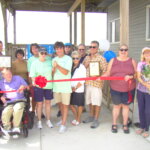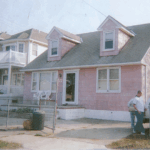To access the Herald’s local coronavirus/COVID-19 coverage, click here.
COURT HOUSE – Long-term care facilities hit hard by COVID-19 are facing financial hardship because of increased costs and lower revenues.
From one of the largest post-acute care providers in the U.S., Genesis HealthCare Inc., to smaller ones, such as Crest Haven Nursing and Rehabilitation Center, in Court House, and The Shores at Wesley Manor, in Ocean City, the financial impacts were largely driven by personal protective equipment (PPE), additional testing and staffing requirements, enhanced cleaning and sanitization costs, the impact of utilizing less efficient modes of providing therapy to avoid the grouping of patients, and underfunding the actual cost of care.
Despite some government funding, studies show that, nationwide, some long-term care facilities may not be able to sustain operations another year, at the current pace, without additional funding.
“The majority of nursing homes are operating at a loss now,” according to a newly published report of 463 U.S. nursing home providers, released by the American Health Care Association (AHCA) and National Center for Assisted Living (NCAL) (https://bit.ly/34H3gt9).
“Nine out of 10 nursing homes said government funding is very important to helping with COVID-related costs and losses, with nearly 60% saying they will experience significant problems when government funding ends,” the report continues.
The report also cites Medicaid’s underfunding, which covers 70% to 80% of care costs.
Genesis HealthCare Cites Financial Impacts
GenesisHealthCare released its second-quarter earnings Aug. 10 (https://bit.ly/3hDncAR), saying the virus had a “significant adverse impact” on the company’s revenues and expenses, particularly given it has a concentration of facilities in the Mid-Atlantic and Northeastern states, both hit hard by the virus.
Genesis HealthCare has 350 skilled nursing facilities and assisted/senior living communities in 25 states nationwide, including four facilities in Cape May County. Genesis facilities in the Mid-Atlantic and Northeast represent 45% of its total operating beds and over 77% of its positive COVID-19 cases in patients and residents.
In Cape May County, all four locations resolved outbreaks, according to a company spokesperson. The last known dates with positive cases at each center, as of Aug. 27, were May 10, at Victoria Commons; June 11, at the Court House Center; July 5, at Victoria Manor; and Aug. 2, at the North Cape Center.
New Jersey nursing homes must be free of the virus for 28 days before fully reopening, per state requirements (https://bit.ly/32wrMus). The phased-in reopening is also based on criteria for staff and resident testing, infection-control protocols, and adequate staffing and PPE, and is tied to the timing of the state’s reopening plan.
Genesis recognized $188 million of federal relief grants and other support under the Coronavirus Aid, Relief, and Economic Security Act (CARES) and $40 million of additional funding provided by certain states, which offset the estimated $213 million impact of COVID-19, related to lost revenue and incremental expenses, according to its earnings release.
They do not break out financials of any particular location, according to a company spokesperson.
“COVID-19 is having, and will likely continue to have, a material and adverse effect on the company’s operations and supply chains, resulting in a reduction in its operating occupancy and related revenues, and an increase in its expenditures,” a company press release stated.
“Even if the company receives additional funding support from government sources and/or it is able to execute successfully its plans and initiatives (to improve its financial position), given the current challenging environment (and factors beyond its control), it may not be sufficient to fund operations, which could force the company to seek reorganization under the U.S. bankruptcy code,” they stated.
Crest Haven Receives Funds
Crest Haven Nursing and Rehabilitation Center received $642,225 in government funding, according to Director Jennifer Hess, which is being used for COVID-19-related PPE, testing, and COVID-19-related staffing needs.
“Crest Haven has experienced a loss in revenue due to stopping new admissions during the height of the pandemic in the county,” she said. “However, this was in the best interest of our community by limiting our COVID exposure. Not having COVID-positive residents or COVID-related deaths is a significant win for the people we serve. Expenditures are naturally lower with a lower census.”
The facility is funded by Medicare, Medicaid-privately paying residents, and by the county government.
At this time, there are no positive COVID-19 cases among staff or residents, according to Hess. Nine employees recovered from COVID-19.
“We only had one positive resident result, which was believed to be a false positive, but we quarantined, as required, and retested. It is our understanding that we were the last facility in the state to have a COVID-positive resident, despite believing it was a false positive,” she added.
The Shores to Serve Seniors for a ‘Long Time’
The Shores at Wesley Manor, which is one of 10 United Methodist Communities, in New Jersey (https://bit.ly/2QLz7kp), received $601,859 in stimulus funds, according to Executive Director Jessica Stewart.
The funds were used to partially offset expenses such as increased PPE, negative air pressure machines, testing, and increased staffing.
“Our residents and families have been very happy with our response to this virus,” Stewart said. “In a recent independent survey, 99% of residents and 97% of families agreed that The Shores responded well to the COVID crisis. Our very low infection rates and high levels of satisfaction have come at a cost, as noted.
“We have reduced capacity in our health care neighborhood to make rooms for isolation purposes. We are in no danger of closing and plan to be serving seniors for a very, very long time.”
Overall, they had 17 employee cases since the start of the pandemic, and five resident cases.
“Today, we have no positive cases, and we pray to stay that way,” she said Aug. 27.
Lessons Learned
One of the state’s requirements on the road to reopening requires facilities to update their outbreak plan with “lessons learned” from the pandemic.
With Crest Haven’s low infection rate infection, Hess said one of their lessons learned was to be “abundantly cautious when dealing with a novel infectious event. While our early interventions, screening, use of PPE, and quarantine seemed excessive to some people, it worked well to protect our residents and staff,” she explained. “Read all that you can and attend educational events. The recommendations changed rapidly and frequently, and it was important for our team to stay abreast of the information.”
Freeholder Jeffrey Pierson, liaison to the facility, said, “We took early aggressive measures once the governor announced his emergency declaration, shutting down the building to outsiders except for medical visits by doctors and required deliveries.
“Employees were temperature-screened daily, cleaning by staff went into overdrive, PPE was issued that must be worn with social distancing, and hygiene stressed. Resident group activities were canceled. Family visits were limited to FaceTime and Skype.”
“Many measures were implemented to keep the residents engaged physically and mentally in their room,” he added. “We also purchased blaster machines to help sanitize rooms and buildings daily.”
Hess said sharing information and looking for best practices helped keep everyone safe and healthy.
“Talk to your professional resources and neighboring facilities to share information and interventions,” she said about other lessons learned. “We always look for the best practices to keep everyone safe and healthy.
“Listen to staff suggestions and feedback. They have great insight into what works or could work better. We found that staff in every department contributed to our development along the way. Their hands-on observations were invaluable.”
At The Shores, Stewart noted, “There can always be lessons learned. I feel that we were very proactive from the start. I don’t feel there was any one thing we weren’t ahead of.
“I think, moving forward, we will always make sure we have an emergency abundance of PPE like we do food and water in the event of an emergency. The suppliers really shut down and made it very difficult to gain momentum on supplies.”
Adequate PPE must be available to staff for present uses and stockpiled for future needs, according to the state’s reopening requirements.
Testing Continues
Another requirement on the road to reopening is regular testing of staff and residents.
Genesis is conducting its own testing through a private lab, according to a company spokesperson. The staff is proactively tested weekly. Patients are tested periodically in their admissions observation unit and as needed.
The company continues to take additional safety steps as the pandemic continues (https://bit.ly/2YIE021).
Crest Haven is testing every two weeks, with the nasopharyngeal swab PCR test. Hess said the frequency may change if they have a confirmed COVID-19 case, or new testing guidelines are issued.
At The Shores, Stewart said they are testing staff weekly, and residents as necessary.
“This means if there is a positive case, we will test residents for a total of two times in a 14-day period,” she explained. “If there are no new cases, then we will stop testing residents. If there are additional positives within that two-week period, we will continue to test.
“There is no financial assistance (for the testing) at this time from the state,” she noted. “The costs are absorbed through insurance and the company for those who don’t have insurance.”
To contact Karen Knight, email kknight@cmcherald.com.








